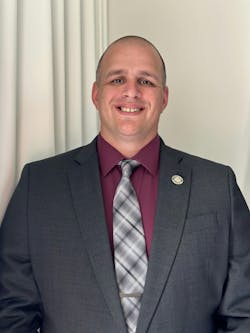Volunteer View: Training to Accommodate Time-Strapped Volunteers
Training in today’s fire service couldn’t be more important. With the all-hazards response that departments provide, members are required to master more skills than their counterparts of even 30 years ago. In addition, departments also provide fire prevention and public education services, which also require specialized training.
How do members stay proficient in all of the skills that they are required to maintain? How does today’s socioeconomic environment affect departments’ capability to provide training? What happens when a member of a department can’t meet the training obligations? Fire chiefs and training officers must answer these difficult questions particular to their department to be able to continue to provide the best services to their citizens.
Current challenges
Delivering training today has many challenges. One that all departments face is the availability of their members—or, in simple terms, time.
Time is finite. We only have 24 hours in each day. With most of the firefighters in the United States being volunteer, this means that the largest portion of most members’ day is taken up by their full-time employment. Factoring in time for sleeping and being with family, members might have very few hours per week to dedicate to training at their department, which is particularly problematic considering courses that require 40–120 hours to complete.
Closely associated with time are the current economic struggles that many families are feeling. Many people work additional hours or multiple jobs to provide for their family. So, any time that members might have beyond their full-time job and their family responsibilities is further diminished.
Nevertheless, members remain dedicated to providing excellent service and maintaining proficiency. Volunteer departments must evolve the way that they deliver training to their people.
Alternative scheduling
Full-time employment schedules of volunteer firefighters vary. This causes conflict with the traditional once-weekly training schedule that a lot of departments employ. It can cause a volunteer to miss crucial training that’s needed to increase their ability to provide service. This is where alternative scheduling comes into play.
Gone are the days of members always being available on Monday nights at 6 p.m. An option is to provide a weekly night training date and a weekend morning training session. This allows flexibility for members to choose a date and time that best fits their schedule.
However, an anticipated problem with this type of delivery is the availability of training personnel. Before implementing additional training sessions, ensure that personnel are available to conduct the training. This might require a department to increase its training personnel.
In addition, certification classes must be flexible, too. Instead of requiring that a 40-hour class be completed on a Monday–Friday, 8 a.m.–5 p.m. schedule, allow for an alternative. That same class might be able to be conducted over two weeks on a weeknight schedule of 6 p.m.–10 p.m. This allows volunteers who work a traditional weekday schedule to attend certification classes.
Again, one must consider that an issue might arise in regard to the availability of instructional staff.
Alternative delivery
Volunteer departments must embrace alternative delivery options for training beyond the traditional in-person instruction method. Two methods that come to mind are online delivery and hybrid delivery. Both methods allow for flexibility to ensure competency of the responder.
Online delivery, which has been around for a long time, has gained more favor as of late in the delivery of certification classes, such as Fire Instructor I and Fire Officer classes. Classes that are delivered via this method allow learners to complete course work on their schedule. If a class is strictly lecture-based, an online delivery method might be ideal, to allow those members who can’t make a normal schedule gain the knowledge or certification.
One major problem with online delivery is that students often feel disconnected from other students or the instructor. An option is for the instructor to present the information live in a video format. The instructor can record the lecture for students who can’t make the scheduled lecture time.
In addition, online discussion boards allow for interaction. Just be sure to not base discussions on questions to which each student will have a similar answer.
The second method of alternative delivery is the hybrid format. This allows students to incorporate both an online learning portion and in-person portion. It also allows departments to maximize the time that’s spent in person to focus on skills training.
To incorporate the hybrid version of delivery, departments utilize an online training platform. (There are numerous vendor options.) On the platform, the department places the lecture (video), PowerPoint or any associated resources that are required. The student then completes the online training prior to the in-person training event. At the in-person training event, the student and instructor can focus on skill delivery, because the cognitive portion of the training already was completed. This maximizes the time for hands-on skill completion and provides for a more efficient utilization of the volunteer’s finite time.
Consider all options
Training is critical to departments’ capability to provide emergency services. Today’s environment has changed, and delivering training has become trickier.
I challenge departments to experiment with training delivery models to see what works best for them and for their members. By changing the way that you deliver training, you can better utilize the volunteer firefighters’ time and allow them to achieve a higher level of proficiency.
About the Author

Justin Bailey
Justin Bailey is the fire chief of the Oliver Springs, TN, Fire Department and a 20-year student of the fire service. He also holds the rank of master firefighter with the Knoxville, TN, Fire Department, where he has served since 2007. Bailey has an associate degree in allied health science from Roane State Community College and a bachelor's degree in fire administration from Columbia Southern University. He speaks regionally and nationally on the topics of volunteer training program development, professional development and rural fireground management.
